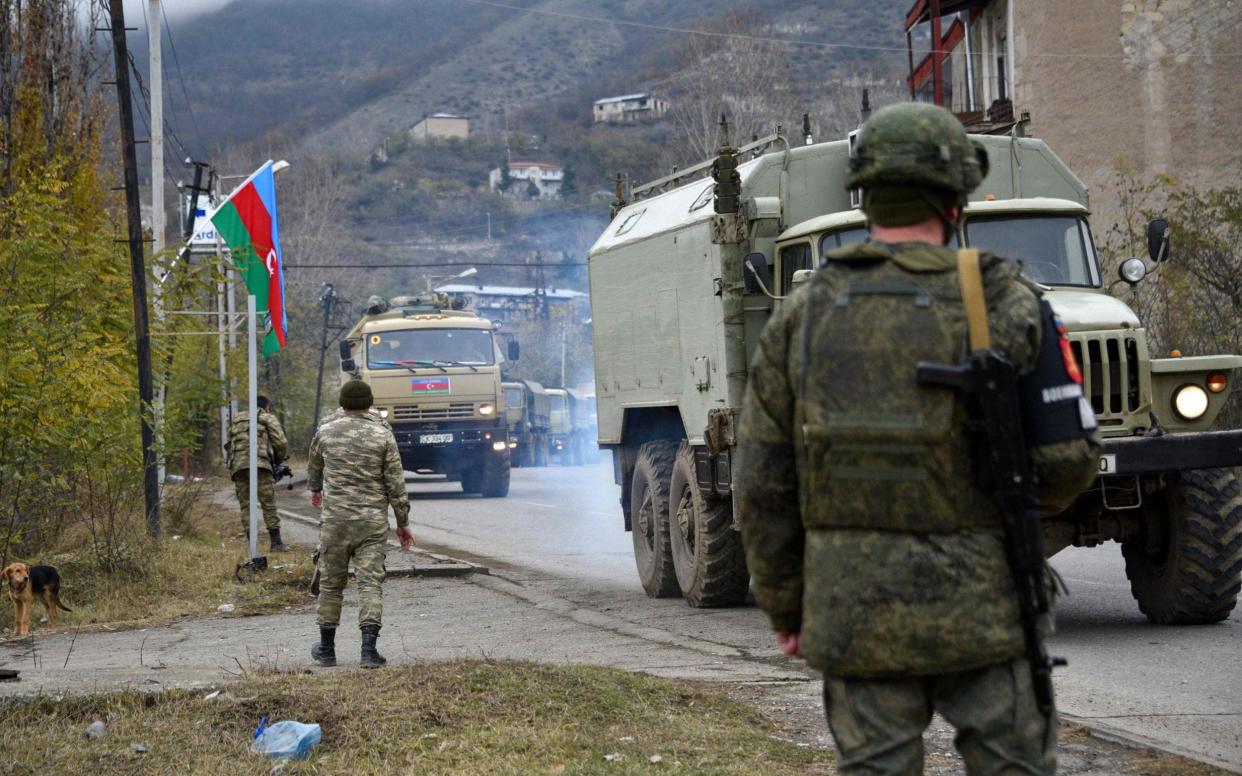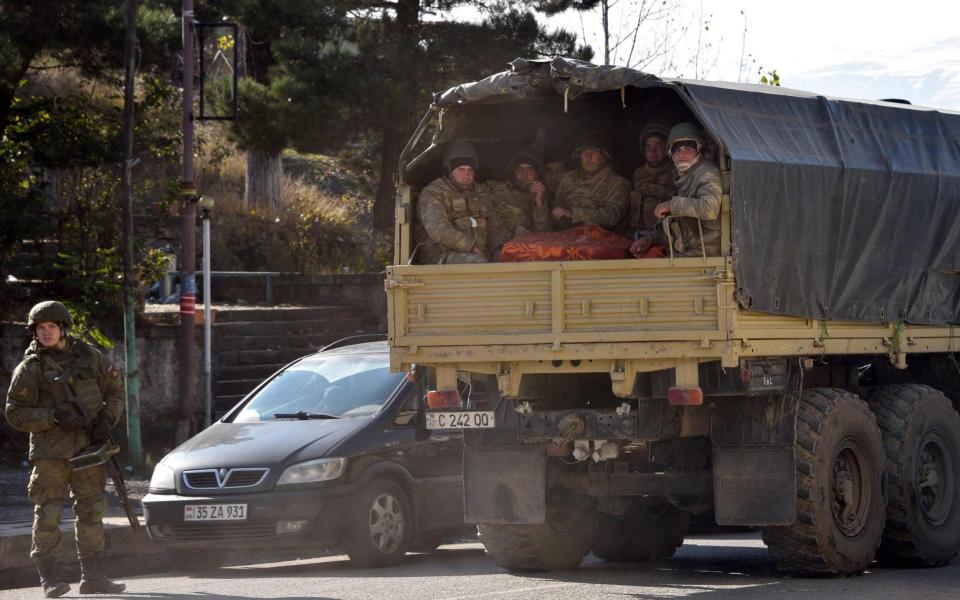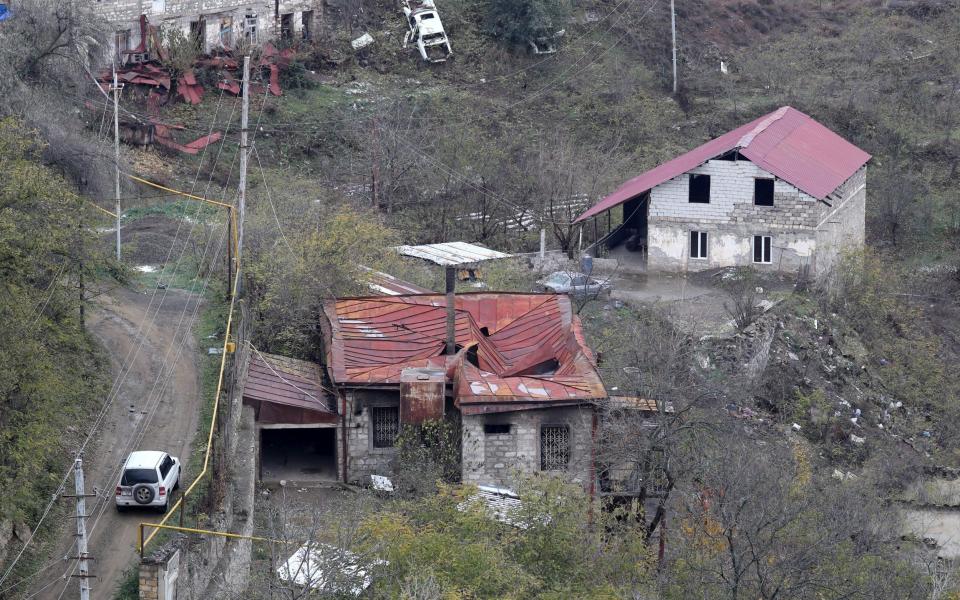Dispatch: Knife-wielding Armenian refuses to leave home as Azerbaijani troops move in to reclaim final swathe of territory

As trucks packed with Azerbaijani soldiers rolled through the empty streets of Lachin on Tuesday, Levon Kevorkyan sat outside his shop armed only with a knife.
Mr Kevorkyan, a 48-year-old Armenian, moved to the town in Nagorno-Karabakh at the end of the last war over the territory between his country and Azerbaijan, two former members of the Soviet bloc.
Now he swears he will not leave, despite the Armenian government’s pledge to return the land as part of a bitterly contested peace deal following the latest eruption of hostilities.
“I will stay here until they raze this place to the ground,” he told the Telegraph, wearing camouflage and a leather biker jacket. “We built this place with our sweat. I have no concerns about dying here.”
On Tuesday, Lachin district was the last of three areas of Nagorno-Karabakh ceded by Yerevan to Azerbaijan under the terms of a Russia-brokered peace deal that ended weeks of armed conflict.

Russian peacekeepers now control the single, winding road that connects Nagorno-Karabakh with Armenia - ensuring safe passage for the ethnic Armenians moving through what is now Azerbaijani-held territory .
In theory the Armenian settlements on either side of the so-called Lachin Corridor fall under the aegis of the peacekeepers, but their fate is unclear as Azerbaijani troops surround them on all sides.
“Nobody knows what’s going to happen to the town,” said Vache Sargsyan, 35, who joined Mr Kervokyan by his shop. “Pretty much everyone has left but we decided to stay here."
Mr Sarsgsyan, a former employee of the local seismological centre, sent his wife and children into Armenia for sanctuary when he was conscripted into the war effort.
“I have a hunting rifle and I’m ready to use it," he said. At this point though the Russians aren’t allowing us to walk around with guns.”
In fact for the Russian taskforce sent to the region to smooth over the transfer of power, these militant hold-outs present an unwelcome obstacle to the tentative deal.
“Go inside and change out of your uniform,” one shouted at Mr Kevorkyan, as an Armenian military officer warned he would be arrested if he failed to comply.
When Mr Kevorkyan moved here in 1994, ethnic Armenian forces had taken not only Nagorno Karabakh but also seven surrounding areas including the districts of Aghdam, Kalbajar and Lachin - all of which have now been returned to the control of Azerbaijan.
During that brutal, six-year conflict - one of the most devastating to erupt during the fall of the Soviet Union - hundreds of thousands of both ethnic Armenians and Azeris were violently ejected from each other's lands.
Today the cycle of displacement and uncertainty has begun again.
“There was a rumour going around the governor had ordered everyone to evacuate by the end of the last week,” said Narine Rasoyan, a 39-year-old who lives with her five children and mother in the village of Aghayno, on the Lachin Corridor.

“Then we were told we don't need to leave. Nothing is clear,” she said, as she strolled down the road past a Russian checkpoint fortified with sandbags and a gun turret. An hour earlier, a dozen Azerbaijani military trucks carrying men and weapons had rumbled along the same road.
“We'd heard that the convoy would pass our homes and that we should be cautious,” she told the Telegraph. “They told us to stay calm. But look at my children - how can I not worry?”
The last remnant of Armenian authority in Lachin is found in a dilapidated building on the road that zigzags up to the hilltop town.
Inside Kerob Movsisyan, a lean and grey-haired officer, oversees a handful of men from the emergency services department who have stayed behind despite the departure of all Armenian soldiers.
“We haven't received that order yet so, until then, we continue our service,” said Mr Movsisyan. “No one really knows who's going to control this area. A few civilians have remained but almost everyone has left - they don't know what's going to happen and just don't feel safe.”
Asked about the mood among his men, he replied with a smile: "Martyrdom."
Back in the town centre, Mr Sargsyan and Mr Kevorkyan watched the Russian peacekeepers mill around the deserted town square - outgunned, outmanoeuvred and yet determined to remain.
“This is our land,” Mr Sargsyan said, among vehicles pockmarked by gunfire and houses burned down by fleeing residents to deny Azerbaijanis use of them.
“There is every reason to stay here.” He glanced at the desolate scene. "Well, one day there might be."

 Yahoo News
Yahoo News 
